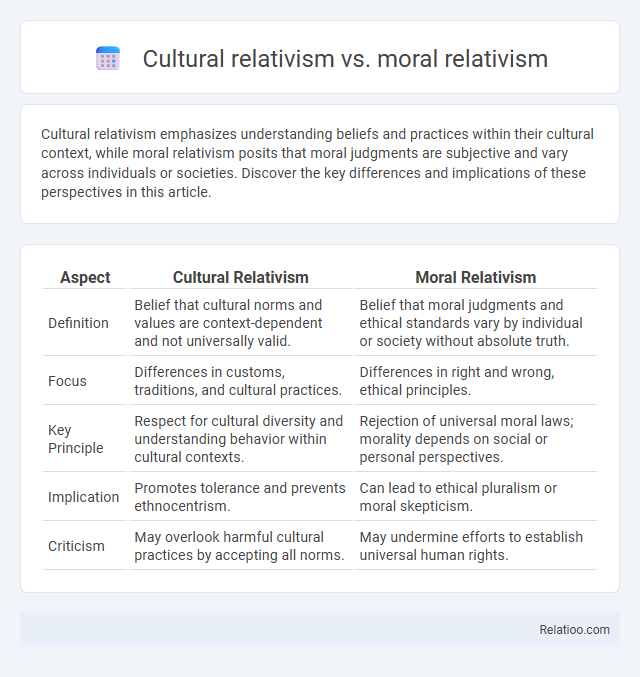Cultural relativism emphasizes understanding beliefs and practices within their cultural context, while moral relativism posits that moral judgments are subjective and vary across individuals or societies. Discover the key differences and implications of these perspectives in this article.
Table of Comparison
| Aspect | Cultural Relativism | Moral Relativism |
|---|---|---|
| Definition | Belief that cultural norms and values are context-dependent and not universally valid. | Belief that moral judgments and ethical standards vary by individual or society without absolute truth. |
| Focus | Differences in customs, traditions, and cultural practices. | Differences in right and wrong, ethical principles. |
| Key Principle | Respect for cultural diversity and understanding behavior within cultural contexts. | Rejection of universal moral laws; morality depends on social or personal perspectives. |
| Implication | Promotes tolerance and prevents ethnocentrism. | Can lead to ethical pluralism or moral skepticism. |
| Criticism | May overlook harmful cultural practices by accepting all norms. | May undermine efforts to establish universal human rights. |
Introduction to Relativism
Relativism explores how truth and morality vary across different cultures and individuals, emphasizing the subjective nature of ethical judgments. Cultural relativism asserts that moral codes are shaped by cultural contexts, making each society's norms valid within its own framework. Understanding these distinctions helps You appreciate that moral relativism focuses on individual perspectives, while cultural relativism centers on societal norms, both challenging absolute moral standards.
Defining Cultural Relativism
Cultural relativism defines the principle that beliefs, values, and practices should be understood based on a person's own culture rather than judged against the criteria of another culture. Moral relativism, in contrast, asserts that moral judgments and ethical standards are not absolute but vary between cultures and individuals. Unlike moral relativism, cultural relativism emphasizes the contextual understanding of cultural differences without necessarily endorsing the relativism of moral values.
Defining Moral Relativism
Moral relativism asserts that moral judgments and ethical standards are not absolute but vary based on individual or cultural perspectives, emphasizing that what is considered morally right or wrong depends on specific social contexts. Unlike cultural relativism, which primarily describes the understanding and evaluation of cultural practices within their own framework, moral relativism addresses the variability of moral principles across societies and individuals. This distinction highlights that moral relativism deals with normative ethics, questioning universal moral truths, while cultural relativism focuses on descriptive anthropology and cultural tolerance.
Core Principles of Cultural Relativism
Cultural relativism is grounded in the core principle that moral codes and social norms derive from cultural contexts, making ethical standards relative to each society without universal judgment. Unlike moral relativism, which emphasizes individual or personal variability in ethical beliefs, cultural relativism prioritizes understanding practices based on cultural traditions and collective values. Your recognition of cultural relativism helps promote respect for diversity by acknowledging that no single culture's morals are inherently superior to another's.
Core Principles of Moral Relativism
Moral relativism centers on the core principle that ethical truths are not absolute but dependent on individual or cultural perspectives, contrasting with cultural relativism which emphasizes evaluating beliefs and practices within their own cultural context. This principle asserts that what is morally right or wrong varies between societies and individuals, rejecting universal moral standards. Your understanding of ethics will shift significantly when you recognize that moral judgments reflect diverse societal norms rather than objective truths.
Key Differences between Cultural and Moral Relativism
Cultural relativism holds that beliefs and values are relative to different cultures, emphasizing understanding customs within their societal context without judgment. Moral relativism argues that moral principles vary between individuals or societies and that no absolute moral standard exists universally. The key difference lies in cultural relativism focusing on customs and cultural norms, while moral relativism centers on the variability of moral judgments and ethical standards across different contexts.
Historical and Philosophical Background
Cultural relativism, rooted in anthropology and emphasized by Franz Boas in the early 20th century, views moral codes and social norms as products of specific cultural contexts, rejecting universal judgments. Moral relativism, influenced by philosophers like Friedrich Nietzsche, argues that ethical principles are subjective and vary across individuals or societies, denying absolute moral truths. Understanding your perspective requires acknowledging these distinctions, as cultural relativism appreciates diversity in practices, while moral relativism questions the very foundation of moral objectivity.
Implications for Ethics and Society
Cultural relativism asserts that ethical norms and values are rooted in specific cultural contexts, shaping moral judgments based on societal traditions and practices rather than universal standards. Moral relativism extends this perspective by emphasizing that moral principles are subjective and vary among individuals or groups, challenging the notion of absolute ethics. The implications for ethics and society involve promoting tolerance and understanding across diverse cultures, but also raising complex debates about the limits of ethical acceptance when confronting practices potentially harmful or conflicting with human rights.
Criticisms and Challenges
Cultural relativism faces criticism for potentially excusing harmful practices by asserting that moral codes are entirely culture-specific, which challenges universal human rights. Moral relativism is criticized for undermining objective ethical standards, making it difficult to resolve conflicts or condemn actions like discrimination or violence. You must navigate these challenges carefully to balance respect for cultural diversity with the need for consistent moral principles.
Conclusion: Navigating Relativism in a Globalized World
Navigating relativism in a globalized world requires balancing respect for cultural diversity with universal ethical principles, recognizing that cultural relativism emphasizes understanding practices within cultural contexts while moral relativism acknowledges the variability of moral judgments across societies. Effective global engagement depends on critical dialogue that avoids both ethnocentrism and ethical nihilism, fostering mutual respect without abandoning core human rights. Embracing this nuanced approach cultivates cooperation and ethical pluralism necessary for addressing complex global challenges.

Infographic: Cultural relativism vs Moral relativism
 relatioo.com
relatioo.com